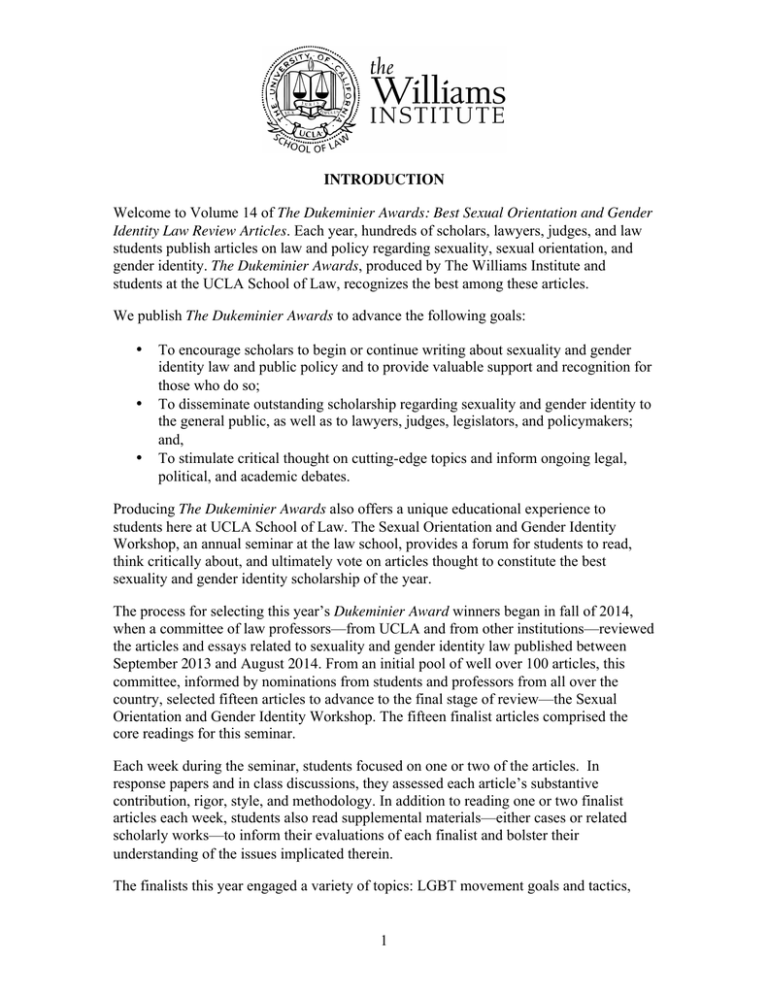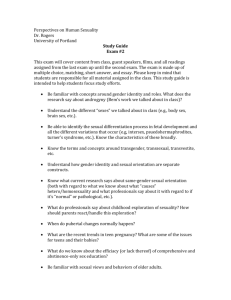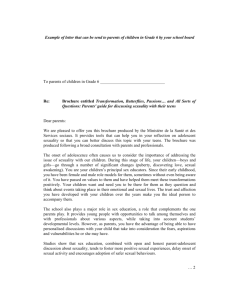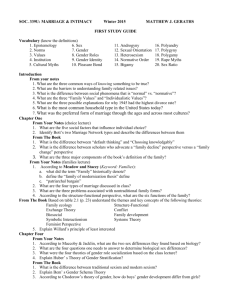
INTRODUCTION
Welcome to Volume 14 of The Dukeminier Awards: Best Sexual Orientation and Gender
Identity Law Review Articles. Each year, hundreds of scholars, lawyers, judges, and law
students publish articles on law and policy regarding sexuality, sexual orientation, and
gender identity. The Dukeminier Awards, produced by The Williams Institute and
students at the UCLA School of Law, recognizes the best among these articles.
We publish The Dukeminier Awards to advance the following goals:
•
•
•
To encourage scholars to begin or continue writing about sexuality and gender
identity law and public policy and to provide valuable support and recognition for
those who do so;
To disseminate outstanding scholarship regarding sexuality and gender identity to
the general public, as well as to lawyers, judges, legislators, and policymakers;
and,
To stimulate critical thought on cutting-edge topics and inform ongoing legal,
political, and academic debates.
Producing The Dukeminier Awards also offers a unique educational experience to
students here at UCLA School of Law. The Sexual Orientation and Gender Identity
Workshop, an annual seminar at the law school, provides a forum for students to read,
think critically about, and ultimately vote on articles thought to constitute the best
sexuality and gender identity scholarship of the year.
The process for selecting this year’s Dukeminier Award winners began in fall of 2014,
when a committee of law professors—from UCLA and from other institutions—reviewed
the articles and essays related to sexuality and gender identity law published between
September 2013 and August 2014. From an initial pool of well over 100 articles, this
committee, informed by nominations from students and professors from all over the
country, selected fifteen articles to advance to the final stage of review—the Sexual
Orientation and Gender Identity Workshop. The fifteen finalist articles comprised the
core readings for this seminar.
Each week during the seminar, students focused on one or two of the articles. In
response papers and in class discussions, they assessed each article’s substantive
contribution, rigor, style, and methodology. In addition to reading one or two finalist
articles each week, students also read supplemental materials—either cases or related
scholarly works—to inform their evaluations of each finalist and bolster their
understanding of the issues implicated therein.
The finalists this year engaged a variety of topics: LGBT movement goals and tactics,
1
including the relationship between legal work and constituent priorities and the subtle
ways in which litigation shapes the priorities of protest organizations; executive and
legislative power to enforce equality; heightened scrutiny for sexual orientation for equal
protection purposes, including critiques of both advocacy for heightened scrutiny and
judicial reasoning about “political power”; the meaning of dignity for same-sex couples;
the power of the civil rights trial; children’s right to be queer; the relationship between
sex discrimination and sexual positions; the recognition of unmarried couples for
purposes of deprivation, rather than bestowal, of benefits; and asexuality.
The three articles that emerged from this dynamic and exciting body of scholarship as
Dukeminier Award winners represent substantial work from rising stars in the legal
academy. Each article breaks new ground in ongoing debates among legal scholars and
practitioners in the LGBT community and beyond. Two of the articles—productively
read together—use careful and exhaustive analysis of cases arising under Title VII to
provide insights into the operation—and shortcomings—of antidiscrimination law in the
contexts of LGBT employees and same-sex sexual harassment. The third brings insights
from the legal and ethical regulation of conscience in medicine to emerging debates over
the conflict between religious liberty and sexual orientation equality.
The winners are:
•
Jessica Clarke, Inferring Desire, 63 DUKE L.J. 525.
Under Title VII, actionable sexual harassment is a subset of sex discrimination. When a
man sexually harasses a woman, he is deemed to discriminate based on sex because he
harasses women and not men. Same-sex sexual harassment is actionable under Title VII,
including when, according to the Supreme Court, there is “credible evidence that the
harasser was homosexual.” Accordingly, courts often draw conclusions about the
harasser’s sexual orientation and same-sex desire. To understand how courts go about
making these determinations, Clarke analyzes federal sexual harassment decisions over a
fifteen-year period. She finds that courts fail to find desire, even in the face of sexually
charged interactions, when the harasser is in a different-sex marriage. Yet courts find
desire in much more ambiguous circumstances when the harasser identifies as lesbian,
gay, or bisexual. Ultimately, Clarke argues that courts’ treatment of sexual orientation
and their preoccupation with sexual desire undermine sexual harassment law’s purpose to
eliminate invidious discrimination based on sex.
•
Brian Soucek, Perceived Homosexuals: Looking Gay Enough for Title VII, 63
AM. U. L. REV. 715.
It is generally thought that in order to receive protection under Title VII’s prohibition on
sex discrimination in employment, lesbian and gay employees must ground their
2
discrimination claims in sex stereotyping, not sexual orientation. By exhaustively
analyzing Title VII sex stereotyping cases, Soucek shows that the relevant dichotomy is
not between sex stereotyping and sexual orientation but between two different ways to
perceive noncompliance with sex stereotypes—as something literally observed or
cognitively understood. Plaintiffs who visibly defy stereotypes and so “look gay”
frequently obtain relief, while those merely thought to violate gender norms—by, for
instance, having a same-sex partner—rarely do. Soucek shows how these cases run
against courts’ usual hostility to claims based on appearance. More broadly, he argues
that these cases complicate leading accounts of antidiscrimination law, which prioritize
blindness and assimilation.
•
Elizabeth Sepper, Doctoring Discrimination in the Same-Sex Marriage
Debates, 89 IND. L.J. 703.
The onset of marriage equality has intensified the conflict between religious liberty and
sexual orientation equality. Those supporting broad exemptions for religious objectors
draw on medical conscience legislation, which allows doctors and nurses to refuse to
perform abortions. Business owners with objections to same-sex marriage are compared
to healthcare providers, and same-sex marriage itself is compared to the objectionable
healthcare procedure. Challenging this move, Sepper shows that objections in the
marriage context lack the features that have justified conscience exemptions in the
medical context. Marriage does not involve issues of life and death; the relationship
between the objector and the objectionable act is more attenuated; and professional ethics
are not implicated. As importantly, Sepper shows that the U.S. experience with medical
conscience laws should provide a warning, not a model. Rather than settle conflict over
abortion, expansive conscience laws have allowed conflict to continue and grow.
This volume of The Dukeminier Awards also recognizes the winner of the Williams
Institute’s annual student writing competition: Andrew Karp, “A Sincerely Held Sexual
Belief”: What LGBT Refugee and Asylum Law Can Learn From Free Exercise Claims
and Post-DOMA Immigration Benefits for Same-Sex Couples.
Karp’s comment urges a more coherent approach to sexual orientation across matters
pertaining to immigration and asylum. Karp shows that in reviewing petitions for
marriage-based immigration, decision makers recognize the fluid nature of sexuality and
do not allow past different-sex relationships to undermine the legitimacy of the
applicant’s current same-sex marriage. Indeed, Karp draws a comparison between
reasoning about sexuality in the marriage-based immigration context and reasoning about
the sincerity of religious belief in constitutional Free Exercise law. In the asylum
context, however, Karp observes a relatively rigid view of sexuality and notes that
decision makers have used past different-sex relationships to question the applicant’s
sexual orientation. Accordingly, Karp urges an approach to sexuality in refugee and
3
asylum law that approximates that used for marriage-based immigration.
A final word regarding the online publication format for these outstanding articles and
the student comment: The Dukeminier Awards is published exclusively online. The
winning articles appear as they did in the journals that first published them. The winning
student comment is published on the Williams Institute website and is also available via
WestLaw and Lexis.
Douglas NeJaime
Professor of Law
Faculty Director
The Williams Institute
UCLA School of Law
July 2015
4








